Beijing
7 Farewell my Concubine (1993) Analysis by Peijun Zhao
Peijun Zhao
Farewell my Concubine (1993)
Directed by Chen Kaige (5th Generation Director)
“A revolution is not a dinner party, or writing an essay, or painting a picture, or doing embroidery; it cannot be so refined, so leisurely and gentle, so temperate, kind, courteous, restrained and magnanimous. A revolution is an insurrection, an act of violence by which one class overthrows another.”
-Report on an Investigation of the Peasant Movement in Hunan” (March 1927), Selected Works, Vol. I, p. 28
Introduction
While Mao Zedong was born a Chinese peasant and lived to see the sunset of China’s Era of Imperialism, he would later live to become the paramount ruler over a quarter of the global population and establish the world’s largest Communist regime. The Communist Chinese Revolution was a sociopolitical movement that started in the 1920s and continued after the Proclamation of the People’s Republic of China on October 1, 1949 (Retief and Wessels 302).
Chen Kaige directed the 1993 film Farewell My Concubine. The movie focuses on the love triangle between three characters: Dieyi, a revered Peking Opera actor who is a hidden homosexual; Xiaolou, who is Dieyi’s childhood friend and stage partner; and Juxian, a prostitute who escaped from the House of Blossom brothels. This film originally premiered on January 1, 1993, in Hong Kong and received positive reviews internationally through its cinematography and touching story (Kristof 2). In China, though, this movie has been forbidden, primarily for its themes of homosexuality, suicide, and a depiction of turmoil during the Communist period in China, before being re-released with censored scenes (Kristof 1).
The following analysis will argue how the director, Chen Kaige, actually uses this movie to criticize the Communist Party and the Cultural Revolution for the historical destruction of Chinese culture, restriction of free will, and penchant for violence. Furthermore, director Chen effectively emphasizes the emotional trauma of his characters through close-up shots, shadows, and color contrasts on the screen. The next section will first include a brief history of Chen Kaige and the Cultural Revolution.
Background Information
“So if Chairman Mao is our Red-Commander-in-Chief and we are his Red Guards, who can stop us? We will make China Maoist from inside out and then we will help the working people of other countries make the world red…and then the whole universe.”
-Red Guard Leader Quote from “China’s Great Proletarian Cultural Revolution: Master Narratives and Post-Mao Counternarratives” (2022), Vol 1, p. 184.
Chen Kaige, born in 1952, is known as one of the leading figures among fifth-generation film directors in China (Lee 1). He was born in Changle, Fuzhou, where his father was a well-known director (Chua and Chiao 2). During the Cultural Revolution, Kaige joined the Red Guards, which was a student-led social movement working to cleanse the Chinese people of impurities. However, what erupted during this period was chaos. Numerous students were encouraged to “out” their own family members to their friends to gain loyalty and acceptance in the Communist Party. Kaige, similar to his peers, denounced his own father and later spent much of his time working in rural China (Chua and Chiao 2). However, as he started growing up, he started regretting his decision to expose his father to the Red Guards (Chua and Chiao 3). As he moved back to the city, he was emboldened by his own experiences as a part of the social movement and wanted to portray his emotions through his film, eventually producing Farewell, My Concubine.
As a fifth-generation director, Kaige’s goal was to identify more free and unorthodox storytelling that was different from the ideological purity of the Cultural Revolution cinema (Lee 4). Rather than portraying a politically charged message about heroic military struggles, Kaige’s films focus on the stories of ordinary people. Though some of the Fifth Generation Movement ended after the 1989 Tiananmen Square uprising, many film directors, such as Director Kaige, continue to embed these values into their filmmaking (Lee 1). With this information in mind, we can start understanding why Kaige was motivated to direct Farewell my Concubine.
Purpose of this Analysis
The three main points of this analysis include the following: the destruction of culture, the restriction of individual liberty, and violent, mob-like mentalities.
Destruction of Culture
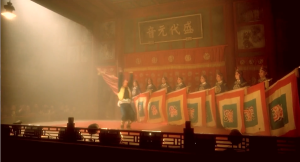
To begin, Peking opera is a form of theatrical performance that started in the 1790s and is regarded as one of the cultural treasures of Beijing (Mittler 377). Known for its fast movements, colorful outfits, archaic dialogue, and singing, Peking opera is a staple of Chinese tradition. However, we see the rapid decay of Peking Opera artifacts after the Communist Party takes over in three sections of the film.
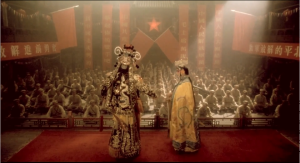
After the Sino-Japanese War, China was in a state of disrepair as supplies were low and the mentality at that time prioritized loyalty to the dominant government party. This notion is visible in the movie at 2:04:50, when many of the original opera house props are missing from the stage compared to the beginning of the movie (Kaige, 23:59). Instead of colorful lights and banners, red flags overcast every section of the opera house, almost to the point of oversaturation. Because the seats have been destroyed by the war, the spectators sit on the empty ground in low lighting. There are also numerous Chinese-themed banners, portraits, and posters hung from each section to emphasize the dominance of politics in the opera house. The audience sees a physical decrease in traditional props, which have been replaced with nationalistic flags. During this scene, Dieyi is forced to perform in front of these individuals because of a previous performance to cater to the Japanese soldiers. As Dieyi makes a mistake, Xiaolou apologizes to the guests before the soldiers in the front start singing the National Anthem. Overall, Kaige’s camera angle captures the dark shadows above the stage and suggests to the audience the decline of Peking opera’s popularity.
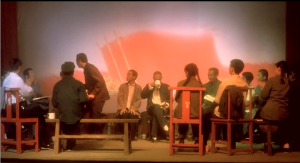
The second time the audience notices the destruction of culture is during the rise of the Chinese Communist Party. In this next scene, Dieyi tries to talk with younger people in the troupe about what he thinks about modern operas and stage performances (Kaige, 2:12:33). For example, he mentions how the outfits aren’t colorful enough and the backdrops are too realistic compared to traditional Peking opera. There is not enough emphasis on ambiance, acrobatics, and movement in China’s newfound contemporary operas, which are focused on the Chinese Revolution and Mao Zedong. However, when he brings up this opinion, he’s immediately shunned by the increased number of youth in the population. Xiaosi, the orphan that Dieyi raises, harshly rebuked Dieyi, stating that the laboring masses are the people now. Later, whenever someone approves of the contemporary opera, all of the young students applaud. This all occurs while the images of Mao Zedong, the rising sun, and the Imperial Palace all project on their faces and the background, painting them red. Though Dieyi later punishes Xiaosi for going against his teaching of Peking opera, Xiaosi declares that Dieyi is breaking the law by not promoting Chinese nationalism enough, which causes him to separate himself from his home. Nevertheless, this scene shows how the Chinese Communist regime has persuaded younger individuals to degrade traditional Peking operas for those favoring a political agenda.
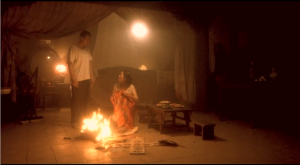
The third moment that culture is emphasized and lost occurs during the Cultural Revolution. During the 1966 Cultural Revolution Bill, the government aimed to preserve Chinese communism by purging remnants of capitalist and traditional elements from Chinese society (Kaige, 2:24:02). During this time, many families, including those of Juxian and Xiaolou, have to burn all their traditional items. In this scene, they start tossing their antiques into the fire, including artwork, clothing, jade cups, and everything else. Here, we see their despair as the fire burns brightly in front of them, dispersing smoke and ashes throughout the house. Desperate and lonely, they turn to each other for solace during this trying time. As they drink from the jade glasses and shatter them against the floor one last time, they try to make the most of their dying tradition. Kaige highlights their despair and sadness over the loss of culture through the darkness of the room and the bright flames of the fire illuminating their sad faces. Nevertheless, these three moments highlight the destruction of Chinese culture and traditions through the erosion of Peking Opera.
Restriction of Liberty
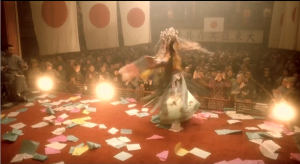
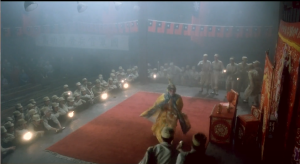
Kaige also criticizes the Chinese nationalistic movements during the 20th century for the constriction of independent thought through Dieyi’s struggles with self-expression. To begin, Dieyi was forced numerous times to perform for the Japanese crowd during their occupancy, either at the opera house or at headquarters (Kaige, 1:20:30). However, when the nationalistic part later regained control of the government, the Chinese community enacted revenge on Dieyi and the opera house for having performed for the Japanese (Kaige, 1:44:16). During a mock performance, the members of the Nationalistic party wave flashlights and flags at his performance in an effort to distract him and worsen his performance. In this scene, director Chen effectively utilizes metaphors and lighting to represent the constriction of civilian freedom. Dieyi tries to run off the stage in this smoke-filled building after he is pressured to keep singing, and the soldiers start running onto the stage. Regardless of where he goes, he is surrounded by soldiers with flashlights pointed into his face. The lights pointed at Dieyi’s face represent Dieyi’s feeling of constriction and suffocation.
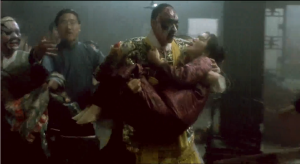
The soldiers also start beating Xiaolou up after someone says, “Can we let him get away with speaking up for the Japanese?” (Kaige, 1:44:40). There are two powerful messages instilled in this section. First, the onset of a nationalistic pariah amongst soldiers allows for limited options on what civilians can respond with. As long as one person says something, the rest will follow, as long as there is some kind of nationalistic thought. Secondly, if civilians don’t abide by the rules or even promote the groupthink of the dominant party, whether that is the Japanese or the Chinese, then they are treated with violence. People are beaten up, lives are lost, as with Juxian’s unborn child, and traditional Chinese artwork is burned. Kaige demonstrates how restricted his characters feel in light of this nationalistic, warlike mentality. The smoke in the background, the darkness of the stage, and the casting of the room in chaos only highlight the ever-growing desperation and constriction of the social movement.
Mob Violence
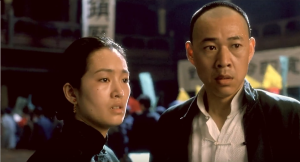
Director Kaige also criticizes the Chinese Communist Party for its blatant mob violence through the lighting and bright color contrasts. In this first scene, Yuan Shiqing, the Count attracted to Dieyi, is set to be executed and has been denounced as a “tyrant” despite his great love of Chinese culture (Kaige, 2:08:08). Xiaolou and Juxian can only watch as this man they asked for help previously is denounced in the face of a crowd. The most important part is when Xiaolou, looking away from the crowd in this scene, asks, “Only execution can satisfy the people’s anger… execution?” Remarkably, Kaige highlights the absurdity of this situation by setting the brightly lit blue and yellow flags behind him as the protagonists look at the camera with ghastly vistas on their faces. No longer can the protagonist, Xiaolou, lead the people like the king he portrays through his acting. He is merely a forced bystander, watching as innocent people are executed and tortured. As the crowd remains in the shadow behind him, this camera angle almost begs to ask the audience how this mob-like mentality unfolded.
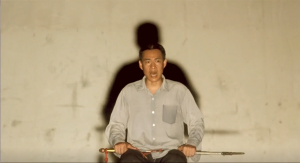
The mob-like mentality also unfolds through the story of Xiaosi during the Communist regime’s indoctrination of the youth. During this period, numerous adolescents were inspired to join the Red Guards and leave their own families if they were suspected of disloyalty. When directing this scene, Kaige likely utilized his own experiences of outing his father (Chua and Chiao 1). For example, after a soldier reports Xiaolou and his troop to the Red Guards, Xiaolou is forced into the interrogation room (Kaige, 2:31:38). In the room, an incredibly bright light casts a shadow on the sword that Dieyi gave Xiaolou long ago. The oil on Xiaolou’s face marks his fatigue and lack of hygiene. Repeatedly, Xiaolou is asked personal questions that Xiaosi knows the answers to. As he is subjected to torture, he is also forced to admit all his crimes in front of Xiaosi, including his convoluted childhood, his wife’s former prostitution, and Dieyi’s homosexuality. All of this suffering stemmed from the mob-like indoctrination of the Communist regime.
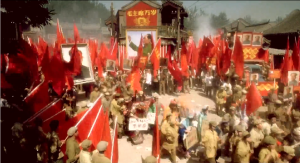
Chen Kaige’s climactic scene at the end of the film fully demonstrates the violent mob mentality when the entire troupe is persecuted in front of the village. Red banners paint the scene red, like blood, and the air is filled with nothing but smoke and fire. Each troupe member, excluding Xiaosi, is forced to put on makeup and wear disparaging signs as the Communist Party yells at them. Dieyi, who has been implicated in this mess, tries his best to simply put on the makeup and walk through the streets calmly. The camerawork here focuses on the constant red—from either blood or the bright, wispy flags—to emphasize the bloodshed resulting from the Cultural Revolution.
Dieyi’s following monologue only emphasizes Kaige’s harsh rebuke against the Communist regime:
“You think disaster just falls from the sky? No. We have come step by step towards this fate. It’s retribution. I’m despicable, and I have been so for a long time. But now even the King of Chu is on his knees begging for mercy. Can Beijing Opera survive? It’s doomed, isn’t it? This is what’s called retribution!” (Kaige, 2:41:05)
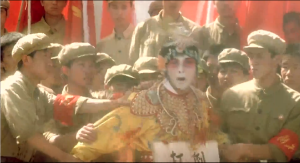
This line refers not only to the depreciation of Peking opera but also to the Chinese people’s acceptance of the Communist Regime’s use of violence against its own people. The phrase “we have come step by step towards this face” indicates that the violent mobs throughout the play are the lack of empathy the Communist Party has towards its people and vice versa. Had more people spoken up about the regime rather than allowing its leaders to indoctrinate the youth and push for extremism, then there would not have been as much bloodshed as noted during the Cultural Revolution. The scene later ends with sad music in the background, emphasized by the fire burning in front of them.
Conclusion
While the Cultural Revolution was a movement intended to revitalize China through groupthink, its execution caused the rapid decline of culture, individual freedoms, and safety. However, this is not the extent of the film. More messages about the relationship between fate and free will are emphasized through Dieyi’s choices and the quotations about fate given by each character. There is also a message about homosexuality and a depiction of modern women in the film. Nevertheless, director Chen does a masterful job highlighting the clear corruption and destruction resulting from the Chinese Revolution and the Communist Party.
Chong, Woei Lien. China’s Great Proletarian Cultural Revolution: Master Narratives and Post-Mao Counternarratives. Edited by Anne-Marie Brady, vol. 1, World Social Change, 2002, https://rowman.com/ISBN/9780742518735/China’s-Great-Proletarian-Cultural-Revolution-Master-Narratives-and-Post-Mao-Counternarratives.
Chua, Lawrence, and Peggy Chiao. “Chen Kaige Interview.” Bomb Magazine, 1 Oct. 1993, pp. 1–4, https://bombmagazine.org/articles/chen-kaige/.
Kristof, Nicholas. “China Bans One of Its Own Films; Cannes Festival Gave It Top Prize .” The New York Times, 4 Aug. 1993, p. 13, https://www.nytimes.com/1993/08/04/movies/china-bans-one-of-its-own-films-cannes-festival-gave-it-top-prize.html.
Lee, Eunah. “Excess and Affect in Post-Traumatic Cinema: Chen Kaige’s Farewell My Concubine (1993).” Reconstruction: Studies in Contemporary Culture, vol. 16, no. 2, Reconstruction, June 2016, https://go.gale.com/ps/i.do?p=AONE&sw=w&issn=15474348&v=2.1&it=r&id=GALE%7CA490983386&sid=googleScholar&linkaccess=fulltext.
Mittler, Barbara. “‘Eight Stage Works for 800 Million People’*: The Great Proletarian Cultural Revolution in Music—A View from Revolutionary Opera.” The Opera Quarterly, vol. 26, no. 2–3, Oxford Academic, Mar. 2010, pp. 377–401, doi:10.1093/OQ/KBQ017.
Zedong, Mao. Report on an Investigation of the Peasant Movement in Hunan. Edited by David Romagnolo, vol. 1, Foreign Languages Press, 1967.
Media Attributions
- © Chen Kaige is licensed under a CC BY-NC-SA (Attribution NonCommercial ShareAlike) license
- © Chen Kaige is licensed under a CC BY-NC-SA (Attribution NonCommercial ShareAlike) license
- © Chen Kaige is licensed under a CC BY-NC-SA (Attribution NonCommercial ShareAlike) license
- © Chen Kaige is licensed under a CC BY-NC-SA (Attribution NonCommercial ShareAlike) license
- © Chen Kaige is licensed under a CC BY-NC-SA (Attribution NonCommercial ShareAlike) license
- © Chen Kaige is licensed under a CC BY-NC-SA (Attribution NonCommercial ShareAlike) license
- © Chen Kaige is licensed under a CC BY-NC-SA (Attribution NonCommercial ShareAlike) license
- © Chen Kaige is licensed under a CC BY-NC-SA (Attribution NonCommercial ShareAlike) license
- © Chen Kaige is licensed under a CC BY-NC-SA (Attribution NonCommercial ShareAlike) license
- © Chen Kaige is licensed under a CC BY-NC-SA (Attribution NonCommercial ShareAlike) license
- © Chen Kaige is licensed under a CC BY-NC-SA (Attribution NonCommercial ShareAlike) license

